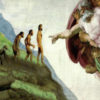There is a reason primitive tribes saw the emergence of the shaman. We originally recognized and even shared a vision of an intuitively understood world.
People look for someone to guide them. Life is scary. Actually no, not my point at all. People recognized that even their personal experiences were strange. The individual self is mysterious and perhaps reflexively scary. The shaman didn’t govern the tribe, almost never, that was handled by a chieftain, those who would later become warlords. The shaman was the one who seemed able to perceive the community spirit. Looked at in a non mystical light, they could be seen as early morale officers. Do we have anything like that today?
TV. The media act as our moral guide now.
The shaman was seen as effective, and eastern cultures never abandoned the practice. The shaman differed from the priest in that they were primarily a seer, an intuitive, more of a creative type than a keeper of dogmatic authority. They could devise an insight into any spiritual turmoil on the fly. The pharmakon of early Rome would have been another example.
Now there are ‘life coaches.’ You can hire them. Yes, and they are fringe. Yes, and questionable quality I think.
Over time, there did come to be medicine societies, lineages of shamanism, shaman and shamanka. More like artistic schools than religious institutions, but without the often narcissistic bent of modern artistic thinking.
I could imagine a shaman guiding religion and science? Potentially, it could be possible. It wouldn’t even have to be patterned after ancient shamanism, but would not some such influence in today’s society serve a positive end?
Buddhism kind of sits in the middle as well. Yes, and Buddhism is growing more and more popular in the scientific community to the point that figures like Ray Kurzweil describe a whole branch of thinking in the disciple of quantum mechanics as the “Buddhist” school.
It’s the only organization I can think of that doesn’t want to take over any others. To the point that it’s influence on Chinese society has lead to people considering themselves as much Christian as Buddhist.
Buddhism is also not centrally organized and is more fluid in adapting into other cultures.
In South America, though predominantly they run toward the religious as a culture, they retain figures they refer to as Curanderos. These figures don’t serve as religious authorities, and instead are sought out for their insight into the troubles that seem to occur for people on a subjective rather than theological or practical level.
Today, the influence of spiritual guides is more with individuals than with groups.
I think that’s a good trend – individual, not dogmatic. The church became too much about power and control, not really about helping people. Spiritual leaders don’t try to control.
Your thoughts are welcome. Be well friends.
Travis Saunders
Dragon Intuitive
~science,mysticism,spirituality~



Leave a Reply